Katy Huth Jones's Blog, page 29
November 15, 2013
Fun Friday: Who Killed Agatha Christie?
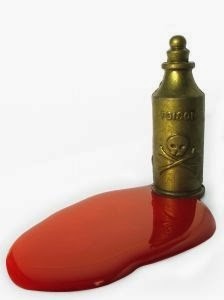 Several years ago I tried something with my creative writing class. I asked each of the 13 students to pick their favorite character from a book, movie, or television show and using lines of actual dialogue, I wrote a crazy "play" which they "performed" using the voices of their chosen characters. This was to show the power of "voice" in creating characters, and we had so much fun with it, I later did the same thing for two other writing classes. Teachers, feel free to use this idea or this actual "play" with your own classes.
Several years ago I tried something with my creative writing class. I asked each of the 13 students to pick their favorite character from a book, movie, or television show and using lines of actual dialogue, I wrote a crazy "play" which they "performed" using the voices of their chosen characters. This was to show the power of "voice" in creating characters, and we had so much fun with it, I later did the same thing for two other writing classes. Teachers, feel free to use this idea or this actual "play" with your own classes.Who Killed Agatha Christie?
by Katy Jones
Cast of Characters
Sherlock Holmes
David Starsky
Al Giordino
Margaret Hale
Elizabeth Bennett
Inigo Montoya
Chewbacca
Cosmo Brown
Eragon
Jack Sparrow
Sponge Bob
Anne Shirley
Gomer Pyle
Setting: Scotland Yard on a cold and creepy night. Sherlock Holmes is by himself, pacing.
HOLMES: I say, where is that replacement I was promised? I need him now.
STARSKY: (Enters) Sherlock Holmes?
HOLMES: Yes?
STARSKY: I'm David Starsky. I was sent to replace Watson. Temporary duty. (They shake hands.)
HOLMES: Yes. You are just in time to help me solve a most grisly murder.
STARSKY: Who's the victim?
HOLMES: Agatha Christie.
STARSKY: Agatha Christie, the writer?
HOLMES: The very one. And we have quite a parade of both suspects and witnesses.
STARSKY: A parade, did you say?
HOLMES: Not a literal one, Mr. Starsky.
STARSKY: No, I'd say it's a literary one. Get it? Since Ms. Christie was a writer?
HOLMES: There is no time to have pun here. We must get down to business. Ah, here come the usual suspects and a few unusual witnesses.
(Enter Margaret Hale, Elizabeth Bennett, Anne Shirley, Inigo Montoya, Jack Sparrow, Al Giordino, Gomer Pyle, Cosmo Brown, Eragon, Chewbacca, and Sponge Bob.)
STARSKY: I see what you mean.
HOLMES: We will waste no time with preliminaries. (Nods his head at the women.) I hope you ladies will forgive the discomfort this may cause your sensibilities.
ELIZABETH: You do err, sir, if you think that my companions and I should be frightened or dismayed.
MARGARET: I agree with Miss Bennet. Only those who are guilty have the need to fear these proceedings.
ANNE: Yes! Let us discover the truth no matter how much it hurts.
HOLMES: If there is no further delay, let me lay the facts before you: That venerable writer of mysteries, Miss Agatha Christie, was most cruelly murdered this very morning by one standing here before us. It has been determined that the murder weapon was the pen with which Miss Christie had been writing her latest novel. The murderer replaced the ink with a substance so poisonous that the victim had merely to touch the pen to her lips, whereupon she expired within moments.
ANNE: Oh, what a terrible tragedy! To die as if she were a tragic heroine in a book. It's so tragic!
MARGARET: And you believe, Mr. Holmes, that one of us present did the deed?
GOMER: Well, whoever it is, I say, shame, shame, shame!
HOLMES: To answer your question, Miss Hale: Yes, not only is one of you guilty of the crime, but one was a witness to the crime who did not prevent it, and is thereby as guilty as the murderer.
INIGO: Excuse me. I do not mean to pry. But do you by chance have six fingers on your right hand?
HOLMES: That is entirely beside the point. I will ask, and you will answer the questions. Starsky, bring forward the first suspect.
STARSKY: Since you're the youngest one present, Miss Shirley, we'll begin with you so you can go home. It's probably past your bedtime.
ANNE: (Sniffing and fighting back tears) Yes, it is, and Matthew and Marilla will be frantic, wondering where I am.
GOMER: Well, bless her little heart.
HOLMES: Silence, if you please, Mr. Pyle. Miss Shirley, where were you at the hour of nine this morning?
ANNE: (Tears forgotten) Oh, that's easy! I was dreaming about being a tragic heroine, like Elaine or Juliet. But whenever I start thinking about that, I think about Gilbert Blythe, and he makes it hard to keep thinking about being a tragic heroine, especially since I've sworn never to speak to him again.
STARSKY: I think you should just stick with answering the questions, Miss.
ANNE: I'm fearful sorry, sir. I didn't mean to run on and on and.....
HOLMES: (Interrupting) Where were you doing this daydreaming, Miss Shirley?
ANNE: That's even easier! I was walking around the gardens on Miss Christie's estate. She has wonderful gardens. The flowers are so beautiful, and you should see the butterflies flitting here and there! I never saw a lovelier sight, other than Green Gables, that is.
STARSKY: So you weren't inside the house during that time?
ANNE: Oh, no, sir. I went outside right after breakfast and lost track of the hours. I didn't return until I realized I was getting hungry again and I noticed it was after noon.
STARSKY: (Looking at Holmes) Well? Can the girl go home now?
HOLMES: No more questions. You'd best run along to your parents, Miss Shirley.
ANNE: I have no parents, sir. I'm an orphan. But Matthew and Marilla are better than any parents could be. See, they wanted a boy, but I was sent, and I'm not a boy. At first Marilla wanted to send me back for a boy, but Matthew liked me so well that....
HOLMES: Thank you, Miss Shirley. That will be all. (She exits) Next suspect, if you please.
STARSKY: Which one of you is Al Giordino?
GIORDINO: (Holds out hand) Hi! How are ya?
STARSKY: (Not shaking it) My state of well being is not the issue here.
GIORDINO: I don't wanna rain on your crazy parade, buddy, but I don't think you're gonna find a suspect here.
HOLMES: What do you mean by that?
GIORDINO: Well, look at all these people and, uh, creatures. How could any of them murder a writer with a poisoned pen? There's no way that should've worked!
HOLMES: Should have worked? Are you suggesting that you had prior knowledge of the poisoned pen?
GIORDINO: I am so tired of being accused of things I couldn't have done!
HOLMES: Couldn't have done? Not "didn't," is it?
STARSKY: Sounds like it could be a guilt complex.
GIORDINO: Hey! We have a big problem here--the murder of a distinguished writer--and you're picking apart the little things, my words.
HOLMES: The little things are infinitely the most important.
GIORDINO: Look, buddy, I have always been a great admirer of Miss Christie. There's no way I would have, could have, wanted to, or otherwise even considered doing her harm. Can I go now?
STARSKY: No. We're not finished with you yet. But we will ask Jack Sparrow to step forward.
SPARROW: Captain. Captain Jack Sparrow.
HOLMES: You are undoubtedly the worst pirate I've ever heard of.
SPARROW: But you have heard of me.
HOLMES: But the very fact that you are a pirate and in league with questionable characters, any of whom would have the means to poison a pen, makes you a prime suspect in this case.
SPARROW: Well, governor, if I really did want to poison a lady, I hope I would have more imagination than to poison her pen. Now a poisoned key, or a poisoned corset--those have possibilities, eh, love? (Smiles at Elizabeth and Margaret)
ELIZABETH: You, sir, are despicable. I do not welcome your attentions.
MARGARET: You have neither couth nor sense, Mr. Sparrow.
SPARROW: Captain, love. Captain Sparrow. And I may not have couth or sense, but I do know a lovely lady when I see one.
STARSKY: That's enough, Sparrow.
HOLMES: Sparrow, your pistol was found to have only one shot, your sword was rusted beyond repair, and your ring's secret compartment was empty, with traces of an unknown powder. How do you account for this unknown substance?
SPARROW: Well, if you must know, it was lemon Kool-aid. I don't like the taste of plain water, so I mix it in my flask. If you hadn't confiscated it, I could show you.
INIGO: (To Sparrow) Excuse me, but do you happen to have six fingers on your right hand?
STARSKY: This questioning is going nowhere. We'll get back to you, Sparrow. Cosmo Brown, which one are you?
COSMO: Here, present, and presently accounted for.
HOLMES: Please state your legal name, not your stage name.
COSMO: Cosmo Brown.
STARKSY: That can't be for real.
COSMO: Blame my parents, then. My Dad wanted to name me George, but Mother wanted my name to be Cosmopolitan. They compromised with Cosmo. Dad figured it sounded a lot funnier than plain ole George.
HOLMES: The point of this questioning is not your name, but rather your frame of mind this morning. Do you deny that you were in a state of rage?
COSMO: Nay, good sir, I was in a stage of rate. Second rate, that is. Thanks to Lena Lamont, I've been consigned to be a background piano player forever. Even my old buddy, Don Lockwood, couldn't get me a real part if his life depended on it. That blasted Lena! She can't sing, dance, or act, but just because I can, she's determined to see me ruined.
STARSKY: You sound pretty upset, Mr. Brown.
COSMO: Oh, no! And even if I were upset, it would be at Lena Lamont, not Agatha Christie. I never read one of her books, by the way. I prefer humorous ones. That's because I've always loved to make 'em laugh! (Sings) Make 'em laugh, make 'em laugh. Don'tcha know, all the world loves to laugh?
HOLMES: That will be all, Mr. Brown.
STARSKY: Gomer Pyle, PFC, step forward.
GOMER: (Saluting) Yes, sir.
STARSKY: At ease.
HOLMES: Mr. Pyle, or should I say, Private?
GOMER: Well, howdy, howdy, howdy!
HOLMES: What do you know about the murder of Miss Christie? Is it possible that the U.S. Marines are trained in poison manufacture?
GOMER: Shazam! The only poison I ever saw was the rat poison we used back home when the rats were just fierce at the fillin' station. I always hated to hurt the little fellers.
HOLMES: Were you in possession of said toxic substance earlier today?
GOMER: Huh?
STARSKY: Did you have any rat poison this morning?
GOMER: Of course not! Shame, shame, shame! I couldn't hurt a nice lady like Miss Christie.
STARSKY: I suppose not. No further questions. Eragon, step forward.
ERAGON: I have nothing to hide.
STARSKY: We'll see about that.
HOLMES: Mr. Eragon, is it not true that you have access to multiple sources of magic from multiple beings, any of whom could be prevailed upon to conjour subtle toxic substances?
ERAGON: I beg your pardon?
STARSKY: Don't you have friends who could make up poisons for you?
ERAGON: Well, certainly, doesn't everyone? It doesn't mean I would have reason to murder a harmless old woman, does it?
HOLMES: Did you not feel that your dragon was in some danger from Miss Christie?
ERAGON: Oh, no, sir. Saphira is perfectly capable of defending herself, especially from an elderly writer. She's used to a writer who is much, much younger.
HOLMES: Perhaps it is the dragon we should be questioning.
ERAGON: I wouldn't recommend it, sir. Saphira has a mind of her own.
HOLMES: An uncertain temperament, is it? Well, we wouldn't want to tempt fate. I understand that you can communicate with her. Can you possibly speak to that--thing, as well? (Points to Chewbacca)
ERAGON: You mean that big hairy walking carpet?
CHEWIE: Arrrrrrrgghhh.
ERAGON: I think he wants you to remove the handcuffs.
STARSKY: Chewbacca can stay where he is, confined and cuffed. He doesn't need to come closer.
HOLMES: Mr. Chewbacca, you have a long history of losing your temper, as well as the unfortunate habit of ripping people's arms out of their sockets when you lose to them in games of chance. Do you deny this?
CHEWIE: Arrgh, rowh, rowh, arrgh.
ERAGON: He says he does not deny it. His speech is not as elegant as Saphira's, of course, but mostly understandable.
HOLMES: In your smuggling adventures with Han Solo, you have also encountered many beings throughout the galaxy more than capable of concocting a swift-acting, deadly poison. Is that not so?
CHEWIE: Arrgh, rowh, rowh, arrgh.
ERAGON: He does not deny that, either.
CHEWIE: Arrggghhhh, rowf rowh rar rowf.
ERAGON: But he adds that he has never had a need to poison anyone.
CHEWIE: Arwgh, rowh, arrgh rowf.
ERAGON: Ripping off arms helps him regain control of his temper better than poison could.
STARSKY: We will NOT be releasing Chewbacca from custody at this time. Inigo Montoya, step forward.
INIGO: Excuse me, but may I see your right hand? Does it happen to have six fingers?
STARSKY: Will you stop it with the six fingers bit? No one here has six fingers.
INIGO: Then I must keep searching.
GOMER: What for?
INIGO: The man who slaughtered my father. I have been searching for him these twenty years. And when I find him, I will go up to him and say, "Hello. My name is Inigo Montoya. You killed my father. Prepare to die."
MARGARET: You should rather find it in your heart to forgive him than to seek revenge yourself.
ELIZABETH: Yes, let these two gentlemen bring the full force of the law down upon that wicked man.
MARGARET: Otherwise you will become as lawless as he was and suffer grievously in this life as well as the next.
ELIZABETH: It would grieve me exceedingly were you to hang for a murderer. You seem a decent fellow.
SPARROW: He's not as charming as he appears, love. And not nearly so interesting as I am.
HOLMES: Silence, all of you. Senor Montoya, are you acquainted with the Dread Pirate Roberts?
SPARROW: My cousin. On my mother's side.
ELIZABETH: Hush!
INIGO: That is the man in black. The one who bested me with the sword, Fezzik with his strength, and Vizzini with his brains.
HOLMES: And how did he dispatch Vizzini?
INIGO: Witha some kind of poison.
GOMER: Shazam!
HOLMES: It was not just any poison, but iocaine powder--tasteless, colorless, odorless, and dissolves instantly in liquid.
STARSKY: And very fast-acting.
INIGO: Let me 'splain. No, there is too much. Let me sum up. I wasa not present when the man in black gave Vizzini the poison. I have never seen this iocaine powder.
MARGARET: (To Elizabeth) That is still very incriminating, is it not, Miss Bennet?
ELIZABETH: Tolerably so, Miss Hale. Pity, though.
STARSKY: Ladies, please! We just have one more suspect. Sponge Bob Squarepants, I assume that is you?
SPONGE BOB: I'm ready!
HOLMES: Mr. Squarepants, where were you at the hour of nine this morning?
SPONGE BOB: Jellyfish Fields.
HOLMES: And what were you doing?
SPONGE BOB: Jelly fishing.
HOLMES: Were you alone?
SPONGE BOB: Oh, no. My best friend, Patrick, was there.
HOLMES: Patrick?
STARSKY: He's a pink starfish.
SPARROW: Are you sure he's not one of Davy Jones' dastardly crew?
SPONGE BOB: No.
STARSKY: No, you're sure, or no, you don't know?
SPONGE BOB: Well, I--
HOLMES: I have solved the case.
STARSKY: How?
HOLMES: Elementary, my dear Starsky. When you have eliminated the impossible, whatever remains, however improbable, must be the truth. Sponge Bob Squarepants, assisted by Patrick the Starfish, is the murderer.
GOMER: Well, surprise, surprise, surprise!
SPONGE BOB: No! It wasn't me!
HOLMES: The motive is obvious. Jealously of Miss Christie's popular books and characters coupled with your declining ratings drove you to murder your rival.
SPONGE BOB: No! It wasn't me!
HOLMES: The method was only slightly less obvious. You and Patrick learned how to extract poison from the deadly blue octopus. You tried cooking it into one of your Krabby Patties, but the poison lost potency once it was heated. So you dipped the tip of Miss Christie's pen in the poison, hoping she might ingest some of it.
STARSKY: Ingenious.
GOMER: Shazam!
GIORDINO: There's no way that should've worked!
MARGARET: Capital deduction, Mr. Holmes.
ELIZABETH: Truly you have a dizzying intellect.
CHEWBACCA: Growwwrrhhhh.
ERAGON: Yes, Chewie, that means you are definitely innocent.
CHEWBACCA: Grumph, arwrgh growlllll?
ERAGON: Of course you may meet my dragon! Saphira would be pleased to see you.
SPARROW: Mr. Starsky, my effects, please.
STARSKY: What?
SPARROW: And my hat.
HOLMES: We have no reason to hold him.
STARSKY: What about the others?
HOLMES: They are all free to go. Except Mr. Squarepants, of course. Lock him up. And then find Patrick the Starfish.
STARSKY: All right, everybody. Break it up! Go home! (All exit)
HOLMES: This case has, in some respects, not been entirely devoid of interest.
Published on November 15, 2013 07:42
November 13, 2013
The Mistress of Misfit Pets, Part 4: Spiders
If you are an arachnophobe, you might not want to read this post.
But if, like me, you are crazy about spiders, I'd love to hear YOUR misfit spider stories!
I caught my first tarantula at age 9 when we moved to Texas and there was a wooded area beside our house. I put it in a large jar in order to observe it, and I checked out a book from the school library to learn more about it. I didn't keep this one long, and I didn't keep another spider as a "pet" until I was about 13 and found large wolf spider in my Dad's greenhouse, which I named "Wolfie."
I thought I'd sealed the mesh over the 10 gallon aquarium, but one day when I came home late from school, I looked in the aquarium to check on Wolfie, and he was missing. Then I happened to look UP and saw him clinging to the wall with his legs spread wide, making him look nearly as large as a tarantula. I panicked, thinking he was going to run off and hide in my cluttered room somewhere, making him more difficult to catch, so I asked my Dad, who had just come home, to help me catch my spider.
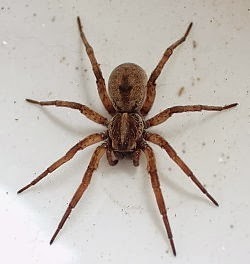 Wolf SpiderHe must have misunderstood, because he brought in the newspaper he was reading, and before I realized what he was doing, rolled it up and SMASHED the poor wolf spider. End of Wolfie.
Wolf SpiderHe must have misunderstood, because he brought in the newspaper he was reading, and before I realized what he was doing, rolled it up and SMASHED the poor wolf spider. End of Wolfie.It was not until I had two sons that we kept more spiders, and always tarantulas. Most of them were the black ones commonly found in Texas, but one year my homeschool band students gave me a rose-haired tarantula as an "end of year teacher gift." Those of you who know me will not be surprised to hear that it was one of my favorite teacher gifts. Ever!
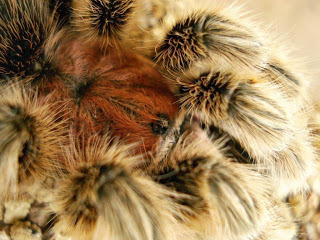 Rosie was a very handsome tarantulaOf course I named it "Rosie" and referred to it as "she." But after Rosie shed her skin, I realized it was a "he," but I didn't change his name because I remembered Roosevelt ("Rosey") Greer, the football player, who always seemed like a nice guy. Hopefully he wouldn't mind sharing a name with my spider.
Rosie was a very handsome tarantulaOf course I named it "Rosie" and referred to it as "she." But after Rosie shed her skin, I realized it was a "he," but I didn't change his name because I remembered Roosevelt ("Rosey") Greer, the football player, who always seemed like a nice guy. Hopefully he wouldn't mind sharing a name with my spider.The second time Rosie shed his skin, a tragedy occurred, and mostly because of me (again). He was so still I thought he'd died, and so in order to preserve his body for my biology class, I spread him out on a plastic dish to let him "dry out."
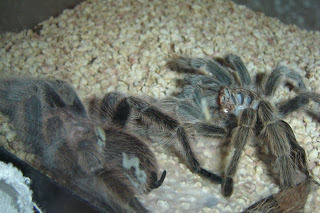 Rosie (left) after just pulling himself out of the old skinThe next morning I realized Rosie wasn't dead, he was just going into that "zone" before shedding, and now I'd moved him to a smooth plastic dish where he had no purchase to pull against the old skin. So the poor guy ended up breaking off his pedipalps, which are the small leg-like appendages near their mouth. Apparently they not only use these for food but for other sensory input, so poor Rosie was like a blind, drunken spider staggering around his habitat. I had to put half-dead crickets right under his fangs so he could eat.
Rosie (left) after just pulling himself out of the old skinThe next morning I realized Rosie wasn't dead, he was just going into that "zone" before shedding, and now I'd moved him to a smooth plastic dish where he had no purchase to pull against the old skin. So the poor guy ended up breaking off his pedipalps, which are the small leg-like appendages near their mouth. Apparently they not only use these for food but for other sensory input, so poor Rosie was like a blind, drunken spider staggering around his habitat. I had to put half-dead crickets right under his fangs so he could eat. I hoped if I could keep him alive until he shed again, the pedipalps might grow back. But Rosie was never the same, and after several months he finally died. I felt so badly for him I sold all my critter habitats at a garage sale and determined not to keep any more tarantulas.
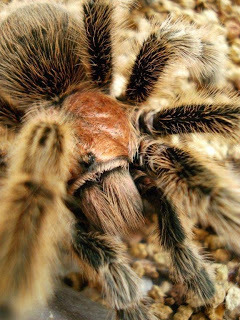 The pedipalps are visible to either side of the fangsBut a former student called me earlier this year and said he'd found a big tarantula on one of his landscape jobs, and did I want him? How could I say no? I even bought a brand new habitat for the spider, with a new drinking sponge and everything. (In case you didn't know, tarantulas can't "drink" water; it's cool to watch them "suck" it from a water-filled sponge just like they suck out an insect's body fluids with their fangs.)I didn't keep this tarantula long. He was a male and NOT happy about being cooped up inside a plastic box, no matter how many juicy crickets I gave him. So I let him go in my backyard to eat the grasshoppers. This photo shows how he felt about being in captivity.
The pedipalps are visible to either side of the fangsBut a former student called me earlier this year and said he'd found a big tarantula on one of his landscape jobs, and did I want him? How could I say no? I even bought a brand new habitat for the spider, with a new drinking sponge and everything. (In case you didn't know, tarantulas can't "drink" water; it's cool to watch them "suck" it from a water-filled sponge just like they suck out an insect's body fluids with their fangs.)I didn't keep this tarantula long. He was a male and NOT happy about being cooped up inside a plastic box, no matter how many juicy crickets I gave him. So I let him go in my backyard to eat the grasshoppers. This photo shows how he felt about being in captivity.
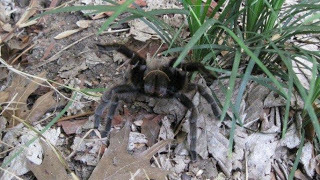 "Back off, lady!"Oh, in case you ever catch a tarantula, if you'd like to know if it's male or female, just look at the front legs. A male has little "hooks" there, which are used to hold back the female's fangs while they're mating. Black widows aren't the only spiders who devour their mates.
"Back off, lady!"Oh, in case you ever catch a tarantula, if you'd like to know if it's male or female, just look at the front legs. A male has little "hooks" there, which are used to hold back the female's fangs while they're mating. Black widows aren't the only spiders who devour their mates.
Published on November 13, 2013 07:16
November 11, 2013
My Dad, My Hero
I was born an Army brat to an officer father who was already a veteran of Korea. Being immersed in Army life until I was almost 13 years old, I took things for granted that civilians didn't notice or understand, such as the regimen of our days (the 5 o'clock post cannon and Taps meant time to go home for dinner) and constant moving (I went to five elementary schools in five states: Hawaii, Kansas, Virginia, Texas, and Louisiana).
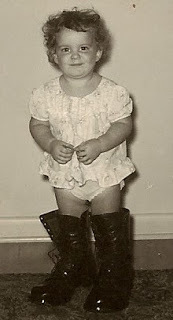 Me in my Daddy's bootsBut one thing I took for granted was that my Dad was my hero. He was tall and handsome and looked sharp and commanding in his uniform.
Me in my Daddy's bootsBut one thing I took for granted was that my Dad was my hero. He was tall and handsome and looked sharp and commanding in his uniform.
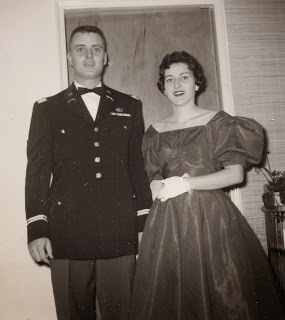 My parents at a military ball in the early 1960'sI didn't learn until many years later how dangerous Dad's assignment in Korea had been. He was an expendable second lieutenant in command of a remote camp training Korean and Chinese POWs to be agents, gathering intelligence among the enemy. After beating the odds that year, he and a buddy fortunately managed to miss their flight home, because the plane went down shortly after takeoff and over 200 lost their lives.
My parents at a military ball in the early 1960'sI didn't learn until many years later how dangerous Dad's assignment in Korea had been. He was an expendable second lieutenant in command of a remote camp training Korean and Chinese POWs to be agents, gathering intelligence among the enemy. After beating the odds that year, he and a buddy fortunately managed to miss their flight home, because the plane went down shortly after takeoff and over 200 lost their lives.
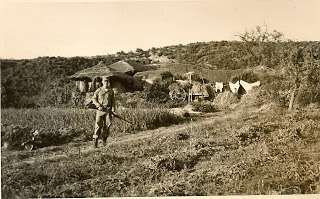 My Dad hunting near a Korean villageAfter TDY (temporary duty) for the CIA, which is where he met my Mom, Dad went to flight school. He later went to Vietnam as a helicopter pilot the summer I turned eight. I had NO idea how dangerous it was to be a chopper pilot in Vietnam. I was more interested in drawing pictures for him, writing letters, and making reel-to-reel tapes. Later my Mom and sister and I would make up care packages to send to the men in Dad's unit as well as for the orphanages.
My Dad hunting near a Korean villageAfter TDY (temporary duty) for the CIA, which is where he met my Mom, Dad went to flight school. He later went to Vietnam as a helicopter pilot the summer I turned eight. I had NO idea how dangerous it was to be a chopper pilot in Vietnam. I was more interested in drawing pictures for him, writing letters, and making reel-to-reel tapes. Later my Mom and sister and I would make up care packages to send to the men in Dad's unit as well as for the orphanages.
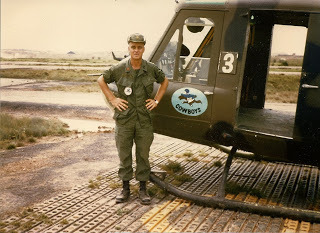 My Dad and his HueyWhen he came home, he showed me the healing bullet wound in his arm, but I still didn't understand what he'd been through until we attended a parade and service in which my Dad would be awarded medals: the Purple Heart, the Bronze Star, and the Distinguished Flying Cross.
My Dad and his HueyWhen he came home, he showed me the healing bullet wound in his arm, but I still didn't understand what he'd been through until we attended a parade and service in which my Dad would be awarded medals: the Purple Heart, the Bronze Star, and the Distinguished Flying Cross.While listening to the commendations, I shared an incredulous look with my Mom. This is what happened to him? He'd really been in danger? Now I finally understood my Dad was a hero to more than just me—he had saved many, many lives and nearly lost his own.
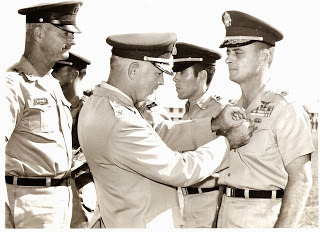 My Dad receiving the Distinguished Flying CrossHis Distinguished Flying Cross citation says this: "Major Huth distinguished himself by exceptionally valorous actions while flying as flight leader of ten unarmed helicopters on a combat assault to seek a known enemy force. On final approach into the landing zone, the ships received fire from both sides. Unhesitatingly, he continued his approach into the area. Upon take off from the area, he received heavy automatic weapons fire, damaging the collective pitch changes links and was wounded. Despite the damage and his wound he instructed the aircraft commander to fly in such a manner as to distract the enemy's attention and to shield the rest of the aircraft in the flight from danger."
My Dad receiving the Distinguished Flying CrossHis Distinguished Flying Cross citation says this: "Major Huth distinguished himself by exceptionally valorous actions while flying as flight leader of ten unarmed helicopters on a combat assault to seek a known enemy force. On final approach into the landing zone, the ships received fire from both sides. Unhesitatingly, he continued his approach into the area. Upon take off from the area, he received heavy automatic weapons fire, damaging the collective pitch changes links and was wounded. Despite the damage and his wound he instructed the aircraft commander to fly in such a manner as to distract the enemy's attention and to shield the rest of the aircraft in the flight from danger."In other words, with a damaged chopper and bleeding from his wound, he made himself a target so the others could get to safety.
He later wrote in his understated way about something which saved his life that day: "The helicopter, which was new and on its first mission, had been hit 14 times and got a good initiation. The maintenance officer was a little surprised with the extensive repair work that had to be done, but I had to thank him for being able to get some armor plating installed in the seats before the mission. This consisted of installing steel plating in the bottom and back of the pilot and co-pilot seats (also installed plating under door gunners). As it turned out, two bullets hit the bottom of my seat and without that protection, my entire day would probably have been spoiled."
Earlier that same day while landing at another site, my Dad's chopper tripped a defective explosive device. He said an IED was pointed right at his head not three feet away, but thankfully did not detonate.
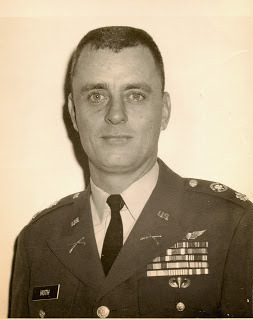 Dad's retirement photo which we used at his funeralTwo years ago tomorrow Dad lost a ferocious battle with his final enemy. My sister and I both thought it would be entirely appropriate for him to die on Veteran's Day, 2011, but he waited one more day. Poetic, actually, for a man who always put others before himself.
Dad's retirement photo which we used at his funeralTwo years ago tomorrow Dad lost a ferocious battle with his final enemy. My sister and I both thought it would be entirely appropriate for him to die on Veteran's Day, 2011, but he waited one more day. Poetic, actually, for a man who always put others before himself.Thank you for your service, Colonel. You'll always, always be my hero.
Published on November 11, 2013 07:29
November 7, 2013
The Speed of Art

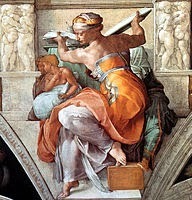 My artist mother, who went to art school for three years, once told me she read that Michelangelo didn't carve his sculptures into the stone, but rather waited until he "saw" what was inside and only then chipped away the stone until the image already fully born in his mind became a reality.
My artist mother, who went to art school for three years, once told me she read that Michelangelo didn't carve his sculptures into the stone, but rather waited until he "saw" what was inside and only then chipped away the stone until the image already fully born in his mind became a reality.Likewise, it took him years to plan and execute such works as the Sistine Chapel ceiling because he so carefully planned all the details (as you can see in the above sketches for and the finished Libyan Sybil).
On the other hand, I remember watching a one hour TV show where an artist "speed painted" an entire picture in 60 minutes. It was impressive, and yet an entirely different way of painting.
 Does one technique negate the other? Of course not! These differences are apparent in all art forms.
Does one technique negate the other? Of course not! These differences are apparent in all art forms.Beethoven, for example, apparently agonized over notes, as his messy surviving manuscripts attest:

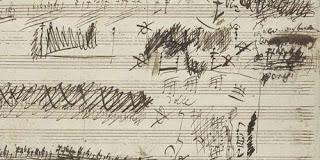 I don't think anyone would fault him for "making corrections" as he composed.
I don't think anyone would fault him for "making corrections" as he composed.Mozart, on the other hand, often poured out an entire composition in a single sitting with NO corrections, as if the piece were fully formed in his mind and he merely "dictated" it:
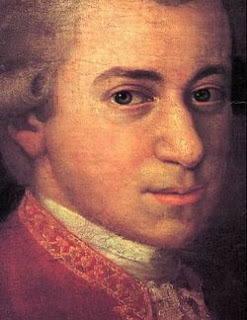
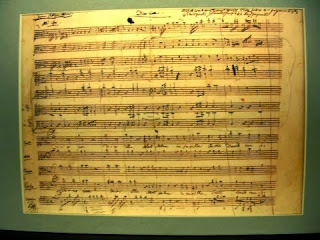 This happens with authors, too. I remember in my early days of writing sci fi I read that Isaac Asimov, who published almost 500 books, was so prolific he said he didn't have time to edit but would make sure what he wrote (on a typewriter) was "right the first time."
This happens with authors, too. I remember in my early days of writing sci fi I read that Isaac Asimov, who published almost 500 books, was so prolific he said he didn't have time to edit but would make sure what he wrote (on a typewriter) was "right the first time."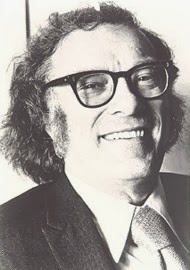 Does this mean if it takes ten drafts to "get a story right" there's something wrong? Of course not! An artist and his/her work are as individual as, well, the individual. And that's a wonderful thing!
Does this mean if it takes ten drafts to "get a story right" there's something wrong? Of course not! An artist and his/her work are as individual as, well, the individual. And that's a wonderful thing!I've had poems appear fully formed in my mind and have had to write them down immediately before they were lost. Once I was driving and dictated a poem to my husband because I was so afraid I'd "lose" it before we got home. The first magazine I submitted it to bought it. The same thing happened with another poem that woke me at 3:00 a.m. (Not the same magazine, though.)
But a story I first tried to write 25 years ago didn't "work." I laid it aside and came back to it a few years later. Two more rewrites didn't make it work either. I came back to it a third time with a drastic rewrite, cutting it in half. Still didn't work.
Then not quite three years ago my father was diagnosed with lung cancer. I needed something to distract me from the daily concern I had over his gradual decline as well as helping my mother with his care. So I dug out the last rewrite of this story, kept the opening scene, and threw away the rest. I decided, just for fun, just as an exercise in "listening" that I would let the characters tell me the story instead of me trying to force a plot on them.
That was more than 300,000 words ago. I'm on Book Three of an epic fantasy that will probably take two more books to finish the entire story. I don't even care if it ever gets published; it's been my "grief therapy" as well as a joy to write.
So which is true "art"? The fully formed fun rhyming poetry that sold right away, or the hundreds of pages of prose pouring from a soul full of sadness over the space of almost three years? I would say, "Both."
After all, art has no "speed," only a great need to be expressed by the one creating it.
(And in case you were wondering about the poems, here's the first one, written while I was driving):
Mannersby Katy Huth Jones
There's a napkin in my lapkinfor the chewing I am doingon this crumbly, yumbly pastrythat my Momma shares with me.
It has sprizzles and some drizzlesand the ooey gooey fillingstarts to dribble, drabble, plop andso I have to lick it off.
Then when Momma sees me lickingall the cream that has been drippingon my sticky, gluey fingersshe says, "What's that in your lap?"
So I answer, "It's a napkin,but my fingers are too gummyso I have to lick the stickies'fore they turn to Elmer's Glue."
So my Momma smiles and leaves meto my chewy, gooey pastryand the napkin in my lapkinis as clean as if brand new.
Published on November 07, 2013 08:06
November 4, 2013
A second chance at music
Not everyone gets a second chance later in life to participate in something they loved in younger years. I was a total band geek in high school and an exceptional flute and piccolo player, but once I got to college and had to fully support myself, it was difficult to stay in school, much less spend the hours necessary to reach a level of proficiency needed to "make a living" at performing music.
So I made the painful decision to put music performance behind me. For a long time I even had trouble attending concerts because the loss was so painful. I did keep my flute, even though there were times when I was tempted to sell it because I needed the money. I even played for a few weddings and other small events, but marriage and babies and homeschooling became my new focus and love in life.
It wasn't until we moved to Kerrville in 1993 that things started happening. First I discovered the high school band director was my old junior high director. He remembered I was a good flutist and asked if I would help his students with private lessons and sectionals. I was reluctant at first because I was so "rusty." Then his assistant went on maternity leave during marching season, and I subbed long-term, being fully immersed in band directing. That experience gave me the nerve to start a homeschool band when we brought our oldest back home after going to public school for 5th and 6th grade.
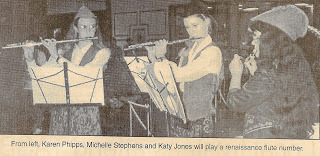 Newspaper picture of me (right--wow, look at that hair!) with two of my favorite students.
Newspaper picture of me (right--wow, look at that hair!) with two of my favorite students.
Then I read in the local paper about an upcoming flute recital by a man who had played in the New York Philharmonic for 36 years with THE Leonard Bernstein. This man, Paige Brook, had recently retired to our small community. So I rounded up several of my flute students and attended his recital.
Afterward my students and I met Mr. Brook, and I asked if he still taught private lessons. He wanted to know if I meant the students, and I said, "No, for me. I used to be pretty good, but I feel like I need to 'catch up' and get some of my skills back." He said, "Well, this isn't New York City, so I won't charge you $50 a lesson, just $25."
Our lessons began in his beautiful hilltop house. Paige's music room had great acoustics. A full-sized grand piano and a beautiful harpsichord filled much of the space. But I soon discovered that even though he was a formidable taskmaster, he had a kind and generous spirit. He said I was "very responsive" and our 30 minute lessons quickly grew to an hour, and then 90 minutes. He threw sightreading pieces at me, one after another, so he could accompany me on piano or harpsichord. I think he had fun playing along with me.
During one lesson we used his new recording equipment to make a tape of me on flute and him on piano as we played two solos for my students so they could listen to the recording while they learned the pieces. Paige would often say he wanted to "teach me his secrets" so I could pass them along to my students, since he no longer had the patience to teach "the kids."
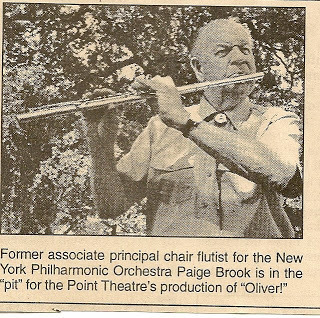 From our newspaper's front page dated 1996.
From our newspaper's front page dated 1996.
Sadly, Paige Brook died in December 1999 from leukemia at the age of 79. He was an amazing person, and I was privileged to know him and be a recipient of his amazing musical talent and generosity.
About this time the local university started an orchestra. Periodically the conductor would ask if I would play with them, but I was overwhelmed with teaching the homeschool band, other homeschool classes, and my public school flute students, so I politely declined.
Then in 2005 I underwent nuclear-bomb strength chemo for fast-growing lymphoma, and for several months I couldn't play my flute, either because of the horrible mouth sores or because my blood counts were so low I had zero energy. It was summer before I was able to practice again, and the conductor called. By this time the university orchestra had grown to become a regional symphony. Most of the string players came from the San Antonio and Austin Symphonies, and most of the wind players were area band directors. They needed a piccolo sub for a patriotic pops concert.
I jumped at the chance. And even though I had to stand for the piccolo solo in "Stars and Stripes Forever" for three performance while I was still almost bald (the stage lights were too hot to wear a wig), it was a joy to play with a group of that caliber. The following spring there was an opening in the flute section.
Since 2006 I've been the piccolo player for Symphony of the Hills, doubling on flute. I needed a better quality instrument, and one of my husband's co-workers just happened to be looking for a new home for her vintage Haynes flute (made the year I was born--how cool is that), which I've dreamed of owning since high school, and I bought a brand new Pearl piccolo (serial #2--I also got to try out #1), which I'm able to play in tune (the most important consideration, in my opinion). Every rehearsal, every concert, I'm fully aware of how blessed I am to have this second chance at playing music.
 Symphony of the Hills; me playing 3rd flute (closest to percussion section).
Symphony of the Hills; me playing 3rd flute (closest to percussion section).
So I made the painful decision to put music performance behind me. For a long time I even had trouble attending concerts because the loss was so painful. I did keep my flute, even though there were times when I was tempted to sell it because I needed the money. I even played for a few weddings and other small events, but marriage and babies and homeschooling became my new focus and love in life.
It wasn't until we moved to Kerrville in 1993 that things started happening. First I discovered the high school band director was my old junior high director. He remembered I was a good flutist and asked if I would help his students with private lessons and sectionals. I was reluctant at first because I was so "rusty." Then his assistant went on maternity leave during marching season, and I subbed long-term, being fully immersed in band directing. That experience gave me the nerve to start a homeschool band when we brought our oldest back home after going to public school for 5th and 6th grade.
 Newspaper picture of me (right--wow, look at that hair!) with two of my favorite students.
Newspaper picture of me (right--wow, look at that hair!) with two of my favorite students.Then I read in the local paper about an upcoming flute recital by a man who had played in the New York Philharmonic for 36 years with THE Leonard Bernstein. This man, Paige Brook, had recently retired to our small community. So I rounded up several of my flute students and attended his recital.
Afterward my students and I met Mr. Brook, and I asked if he still taught private lessons. He wanted to know if I meant the students, and I said, "No, for me. I used to be pretty good, but I feel like I need to 'catch up' and get some of my skills back." He said, "Well, this isn't New York City, so I won't charge you $50 a lesson, just $25."
Our lessons began in his beautiful hilltop house. Paige's music room had great acoustics. A full-sized grand piano and a beautiful harpsichord filled much of the space. But I soon discovered that even though he was a formidable taskmaster, he had a kind and generous spirit. He said I was "very responsive" and our 30 minute lessons quickly grew to an hour, and then 90 minutes. He threw sightreading pieces at me, one after another, so he could accompany me on piano or harpsichord. I think he had fun playing along with me.
During one lesson we used his new recording equipment to make a tape of me on flute and him on piano as we played two solos for my students so they could listen to the recording while they learned the pieces. Paige would often say he wanted to "teach me his secrets" so I could pass them along to my students, since he no longer had the patience to teach "the kids."
 From our newspaper's front page dated 1996.
From our newspaper's front page dated 1996.Sadly, Paige Brook died in December 1999 from leukemia at the age of 79. He was an amazing person, and I was privileged to know him and be a recipient of his amazing musical talent and generosity.
About this time the local university started an orchestra. Periodically the conductor would ask if I would play with them, but I was overwhelmed with teaching the homeschool band, other homeschool classes, and my public school flute students, so I politely declined.
Then in 2005 I underwent nuclear-bomb strength chemo for fast-growing lymphoma, and for several months I couldn't play my flute, either because of the horrible mouth sores or because my blood counts were so low I had zero energy. It was summer before I was able to practice again, and the conductor called. By this time the university orchestra had grown to become a regional symphony. Most of the string players came from the San Antonio and Austin Symphonies, and most of the wind players were area band directors. They needed a piccolo sub for a patriotic pops concert.
I jumped at the chance. And even though I had to stand for the piccolo solo in "Stars and Stripes Forever" for three performance while I was still almost bald (the stage lights were too hot to wear a wig), it was a joy to play with a group of that caliber. The following spring there was an opening in the flute section.
Since 2006 I've been the piccolo player for Symphony of the Hills, doubling on flute. I needed a better quality instrument, and one of my husband's co-workers just happened to be looking for a new home for her vintage Haynes flute (made the year I was born--how cool is that), which I've dreamed of owning since high school, and I bought a brand new Pearl piccolo (serial #2--I also got to try out #1), which I'm able to play in tune (the most important consideration, in my opinion). Every rehearsal, every concert, I'm fully aware of how blessed I am to have this second chance at playing music.
 Symphony of the Hills; me playing 3rd flute (closest to percussion section).
Symphony of the Hills; me playing 3rd flute (closest to percussion section).
Published on November 04, 2013 12:44
November 1, 2013
The Mistress of Misfit Pets, Part 3: Crayfish
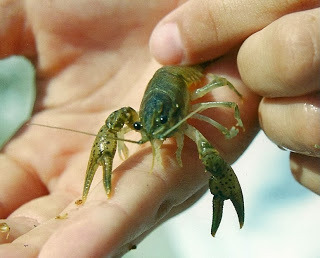
When I went to collect water plants for my aquarium at a place where a spring feeds into our river, little did I know I'd picked up an interesting hitchhiker. After putting the plants in the aquarium, I noticed something tiny crawling along the bottom. I had to get a magnifying glass to be sure, but it looked like a transparent shrimp. Over the next few days this little crustacean molted more than once and it became apparent what it was: a crayfish (otherwise known as a crawdad or "mud bug").
This little guy was fascinating to watch. He constantly moved around, using the tiny claws on his lesser legs to pick up bits of food and bring them to his mouth. He held his big claws immobile, unless he felt threatened. Then he'd rear up and hold them open, daring everyone and everything to come closer.
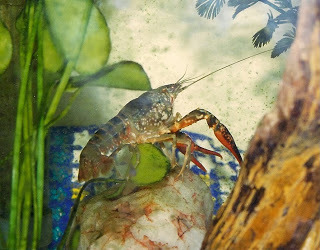 King of the Aquarium on his favorite rock
King of the Aquarium on his favorite rockIn a short time he grew to "eatin' size" and became king of the aquarium. I read that people feed lettuce to crayfish in captivity, but this one preferred fish food. I discovered that crayfish are escape artists after he went missing one day, and I finally found him resting on top of a wet towel on the bathroom floor, two rooms away!
I also learned that this crayfish was a male, so I searched at the river for a female, thinking (of course) that it was time for baby crayfish. The female laid eggs on her swimmerets (otherwise known as "in berry") and everything was going swimmingly until Mr. and Mrs. Crayfish had a BIG fight. I woke up one morning to discover that Mrs. Crayfish had pulled off Mr. Crayfish's claws during the night. He could still eat with his little feeding claws, but he sure looked pitiful.
I hoped that when Mr. Crayfish molted again his claws might regrow, but he didn't make it. Mrs. Crayfish died of a broken heart (or guilt?), without hatching eggs, so I had to start over with a new crayfish from the river.
This one was also good at squeezing through narrow spaces and I constantly had to put him back in the aquarium. One day, however, I couldn't find him. I searched the whole house and thought I was going to have to find him by the smell when he died (yuck) but when I turned on the clothes dryer, he shuffled out from under it. He could hardly move because he'd been out of water all day, and because he was covered with dog hair. That's why I didn't see him when I shone the flashlight under the dryer. Oops—gotta vacuum under there, too.
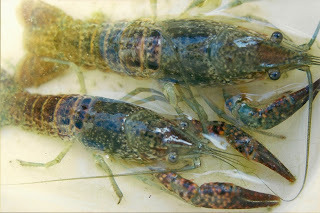
I must report that this, my last crayfish, also went to that bayou in the sky. He had a "mishap" when he molted and somehow managed to pull off both claws and end up with his gills outside his carapace instead of under it. He held on for two days, but I guess he couldn't "breathe" properly.
Because of my fascinating experiences with these funny little mud bugs, I can no longer eat crayfish. For me, at least, "crayfish are friends, not food."
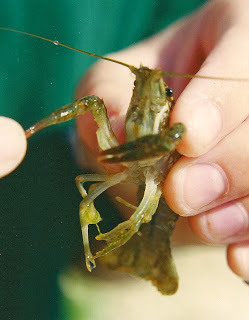
Published on November 01, 2013 07:12
October 30, 2013
The Mistress of Misfit Pets, Part 2: Birds
 Green parakeet aka budgerigar from Wikipedia
Green parakeet aka budgerigar from WikipediaConsidering how much I love birds now, it wasn't always so. As a child I had a green parakeet, which my mother occasionally let out of his cage to fly around (and once sucked him up in the vacuum cleaner—thankfully it was one of those old canister models, and we found him alive inside, though pretty traumatized, poor thing). I wasn't too enamored with this bird, preferring to look for my own critters in the wild.
When our oldest son was about a year old, someone gave us a blue and white parakeet, and for some reason we named him George. We should have named him Grumpy, because he was not friendly. I think he must have been the source of the phrase, "bite the hand that feeds you." Usually when he molted, he'd lose a few feathers and they'd grow back. But after several years of healthy, grumpy living George lost almost all his feathers at one time, and no matter what I tried—topical meds, food supplements, etc.—he remained a pitiful, almost naked parakeet.
George got out one day when one of the boys left the door open, and we never saw him again. I imagine he either thrived in San Antonio and his bird leprosy was cured, or he was a quick meal for a hawk or cat.
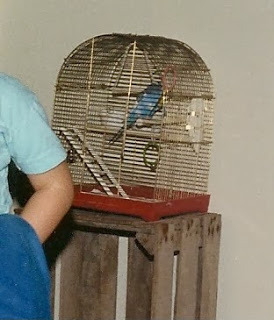 Only known photo of George, the misfit parakeet
Only known photo of George, the misfit parakeetI didn't get another bird until my Zebra finches, which I named Cheeky and Pumpkin (who appear briefly in my novel, Leandra's Enchanted Flute). I wanted to see if they would lay eggs, so I bought a nesting basket, which they ignored. Pumpkin preferred the purple gravel dish, and promptly laid three eggs.
The blind, featherless babies were fascinating to watch as they changed dramatically from day to day. Unfortunately, two birds were noisy and messy enough, but five were just too much for our little house. A local assisted living facility had a large aviary for their residents, and one day while my homeschool band was performing for them, I noticed there weren't many birds in this large space, so I asked if they would like five more residents. They were thrilled, and I brought Cheeky, Pumpkin, and their three now grown offspring to live in this wonderful aviary with new bird and human friends and plenty of room to fly around, compared with their cramped cage.
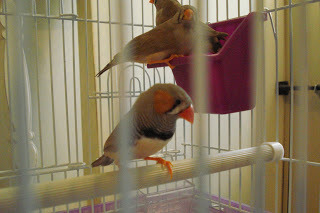 Cheeky, whose personality matched his name
Cheeky, whose personality matched his name
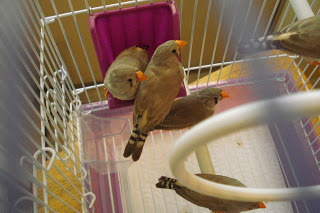 The 3 offspring and their purple plastic "nest"
The 3 offspring and their purple plastic "nest"As much as I love birds, I plan to observe them in the wild from now on. I have two feeding stations and bird baths—one in the front yard and another in the back. My resident Carolina wren, whom I call Songcatcher of course, sings to me from the front feeder almost every morning.
I guess sometimes nature needs to stay outside, where it belongs.
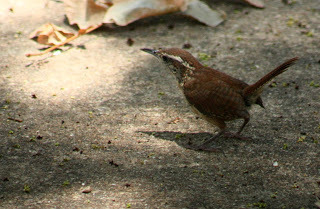 One of many Carolina wrens who have called our yard "home."
One of many Carolina wrens who have called our yard "home."
Published on October 30, 2013 09:51
October 23, 2013
The Mistress of Misfit Pets, Part 1: Fish
Perhaps I should call myself the "misfit mistress of misfit pets" because sometimes it's been my fault!
Since I was a child I've been fascinated with animals. I almost changed my college major from music to biology, and even took extra science courses. I'd rather visit an aquarium or zoo than an amusement park, and I have to consciously NOT try to catch every spider, lizard, snake, etc. in my yard to keep as a "pet." (I do catch-and-release if I find them in the house, however.)
For my tenth birthday I received my first real aquarium with a filter and a light. Up to that time I'd had goldfish in bowls, but now I could observe some "real" tropical fish. Along with a pair of black mollies and swordfish, I selected a pair of guppies. Being a serious scientist I checked out books on fish and read that guppies were also known as "mosquito fish" because they eat mosquito larvae. I had to see that for myself, so naturally I found some mosquito larvae in a bowl of rainwater outside and dumped them in my aquarium.
After a day or two my mother remarked that "there sure were a lot of mosquitoes in the house." Oops! I guess my two guppies couldn't eat all the larvae I'd put in their tank.
I had as many as five aquariums at one time, in order to house all the prolific guppy offspring. I even "fish sat" my high school biology teacher's fancy guppies one summer, and took the opportunity to improve my guppy genes by breeding his long-tailed males with my hardy females. I did make a little money by selling some fish to a local pet store, but not nearly enough offset the cost of supplies. So another budding fish breeder went down the drain.
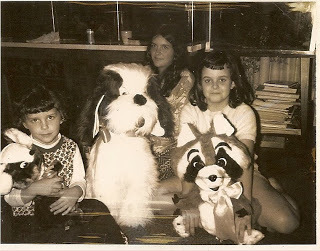 Me at age 12 (in back). You can see 4 of my 5 aquariumsThe saddest fish story happened just two years ago. We had a 55 gallon aquarium with a large goldfish who began life as a feeder fish. When it was time to feed him to our garter snake, his little eyes looked so sad I couldn't bear to give him to the snake, so he joined the tropical fish in the big aquarium and outlived them all. He was several years old and about 10 inches long with a very (*ahem*) original name—Goldie.
Me at age 12 (in back). You can see 4 of my 5 aquariumsThe saddest fish story happened just two years ago. We had a 55 gallon aquarium with a large goldfish who began life as a feeder fish. When it was time to feed him to our garter snake, his little eyes looked so sad I couldn't bear to give him to the snake, so he joined the tropical fish in the big aquarium and outlived them all. He was several years old and about 10 inches long with a very (*ahem*) original name—Goldie.
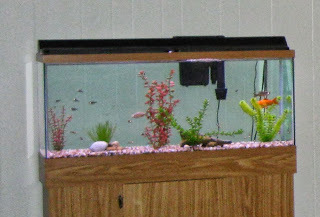 55 gallon aquarium with tropical fish and GoldieTo keep Goldie company I bought a pair of fantails. Then a friend's stock tank sprung a leak and they offered me some of their feeder goldfish which had grown quite large. Of course! A 55 gallon aquarium is just BEGGING for more fish.
55 gallon aquarium with tropical fish and GoldieTo keep Goldie company I bought a pair of fantails. Then a friend's stock tank sprung a leak and they offered me some of their feeder goldfish which had grown quite large. Of course! A 55 gallon aquarium is just BEGGING for more fish.
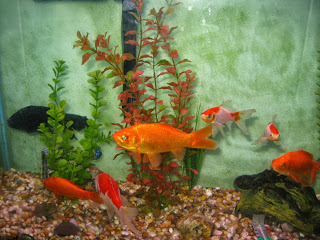 Goldie (in the middle) with his goldfish friendsAll went well until my niece visited and, of course, we had to look at the fish at the pet store, and of course there was an unusual goldfish that we HAD to buy, naming it Gypsy because of the beautiful swirly fins it had.
Goldie (in the middle) with his goldfish friendsAll went well until my niece visited and, of course, we had to look at the fish at the pet store, and of course there was an unusual goldfish that we HAD to buy, naming it Gypsy because of the beautiful swirly fins it had.I should have quarantined this fish, but I wasn't thinking, and by the next day Gypsy had developed ick and fungus and dropsy, and within 24 hours had died, even after I doctored the entire tank. Naturally, she was a plague carrier, and one by one the other fish died, too. Even Goldie. Only one of the fantails managed to survive another year. I moved him to a 10 gallon aquarium, and he might still be alive today, but he somehow managed to jump out through the only opening in the cover, which was smaller than his long body. I found him dried up one morning when I went in to feed him.
Maybe someday I'll work up the nerve to set up another fish habitat, but for now I'll just have to enjoy the fake but realistic fish in my bathroom "aquarium."
 My low maintenance bathroom "aquarium"
My low maintenance bathroom "aquarium"
Published on October 23, 2013 05:02
October 21, 2013
My Jazz Initiation

Not long ago our symphony was scheduled to play a pops concert with the Preservation Hall Jazz Band from New Orleans. We didn't get the music for our portion of the program until a week before the concert, so I spent many hours practicing my many, many fast notes and solos (we were also going to play a lot of "Americana" type music). Because the personnel for a pops concert is not usually the same as for the regular season concerts, we only had one practice scheduled for the day of the concert.
So from 9:00-12:00 the symphony practiced our non-jazz pieces, and then we were given fancy folders from the jazz band to use for the afternoon practice (and I honestly figured I wouldn't have any parts, being the piccolo player). But one of the pieces, "Mardi Gras Medley," had a piccolo solo with the words "stand up" written in pencil.....sounded ominous to me.
After lunch we just "ran through" the several songs we were to play with the jazz band--no "practice" at all! I was pretty much confused and lost, especially when the arranger (who's a white guy with a wild-looking Afro) looked right at me and said, "there's a piccolo solo in the medley." I could hardly read the rhythms, much less understand WHY there was a piccolo solo!
So after this 'rehearsal' I found the arranger, who is a very nice man named Ben Jaffe, and asked him to please help me understand, as I really knew very little about jazz.
He said he wrote the solo for piccolo after hearing a man whistle the melody while playing piano. OH! My non-jazz-trained light bulb finally came on. I asked the symphony conductor if it was all right for me to wear a jazzy red hat during my solo so I could "get into" the part. He said, "Sure, why not?"
I didn't tell anyone else about the hat and kept it in my black bag under my seat. When it was time for the "Mardi Gras Medley" (the last and longest piece of the concert), the arranger announced to the audience that there would be a piccolo solo in this song. Since it begins with the piccolo playing what sounds like an old "field call" from slave days, everyone probably figured that was the solo.
After I played that opening lick, I raised my stand a little so I could see the music when I stood up (I had practiced it over and over during our little break to make sure I had it "down" in case I couldn't see the music). A few measures before I was supposed to stand up, I pulled out the hat and put it on while hiding behind the stand. The flute player who sits next to me whispered, "What is that?" but I couldn't answer then or I would have missed my cue.
Then I stood up, shaking like a leaf (cuz I felt like a fish out of water) and tried to pretend I was "one of the guys" while I played that solo like a whistling jazz musician. I didn't see or hear anything else until I sat down and pulled off the hat. The audience was clapping and the flute player said I was moving with the music, so I guess the hat really helped. She also said the guys in the band turned around and watched me.
After the concert I put the hat back on and found the arranger. He said I did great and hugged me. I thanked him for broadening my music horizons, and he looked at the black sax player next to him and said in his Louisiana drawl, "Oh, she's comin' to the dark side."

I almost forgot to tell you---because this group travels and plays with symphonies all over, at the bottom of my music several other piccolo players had signed in pencil: "Hi from Nashville! Joy" "Hi from Minneapolis! Carol" etc., so I wrote "Hi from Kerrville, TX! Katy."
Published on October 21, 2013 06:11
October 16, 2013
Stage Fright
 Twenty years ago I wrote a little book about the Navajo Code Talkers of World War II, the result of research I did for a magazine article. The Code Talkers became my heroes, and I wanted to share their story with children, since there were no books on the subject for young readers.
Twenty years ago I wrote a little book about the Navajo Code Talkers of World War II, the result of research I did for a magazine article. The Code Talkers became my heroes, and I wanted to share their story with children, since there were no books on the subject for young readers.I had no way of knowing how much this little book would S-T-R-E-T-C-H me!
First local teachers asked if I could speak to their classes about the Code Talkers. I made posters using USMC photos I'd obtained, maps of Dinetah (Navajo land) and the Pacific battles where they fought, and a set of large illustrated alphabet cards in English and Navajo, which is always the students' favorite part no matter how old they are. Gradually this painfully shy writer grew more comfortable with speaking to classrooms of children, sometimes two or three classes brought together. After all, this was a subject near and dear to my heart, and after a few minutes my passion would overcome my nervousness.
Word spread. I received more and more calls to speak about the Code Talkers. A friend across the state set up three school visits in two towns. I brought my posters and books to sell, since after each presentation there were always many people who wanted to buy the book. But these "school visits" turned out to be something way more than I had yet encountered.
At the first school, I had to speak to ALL the seventh and eighth graders in their gymnasium. Fortunately the bleachers were short, so even though the students spread out across the court, I could still "reach" them by walking across the front, holding up a poster in one hand and the microphone in the other. Constantly moving also helped use my nervous energy, so the little quaver in my voice wasn't so noticeable.
But at the high school I spoke from the stage in their auditorium. It wasn't ideal, but the small size made it cozier than it might have been. I used some of my visuals even though the students in back (who weren't paying attention anyway) couldn't see them.
Finally the librarian drove me to the next town. We were running late, so as soon as we parked I grabbed my heavy box of posters and books and rushed to the door. Out of breath, I entered a large auditorium packed with hundreds of people. I later learned that ALL of the students from sixth through twelfth grade were present, as well as people from the community who had seen the advertisement in the local paper!
To compound the situation, a handsome young man named Steve was up on stage holding a mic (comfortably, of course) and working the kids into a frenzy! He was a professional football player who'd graduated from this high school, and he was bragging about how he could bench press 475 pounds.
My knees turned to jelly. I literally lost my grip for a moment and sank to the floor in the foyer. I knew then I had two choices: I could pass out (my preference) or march up on that stage without my visuals and pretend like I knew what I was doing!
After Steve answered the last question, the auditorium burst into thunderous applause. When the principal introduced me, I thought, "Why in the world did you put me AFTER Steve?" But while the more subdued applause began, I took a deep breath, tried to smile, and walked out to shake the principal's hand. I took the mic and tried to look confident, even though I was trembling all over.
I said, "Well, Steve is going to be a tough act to follow. After all, the most I ever bench pressed was 85 pounds." The kids laughed and clapped for me, and I no longer felt like I might faint.
The worst part was that I was so far above them I felt disconnected from the audience. I tried to make up for my lack of visuals by putting as much passion into my talk as I could. I pretended I was IN the audience and had never heard the story of the Navajo Code Talkers. Then I noticed an older man on the front row, probably a World War II veteran. He kept nodding his head, so I tried to speak to him after that.
Oddly enough, I saw fewer disinterested students in this huge audience than in the smaller one at the other high school. By the time I finished forty minutes later, I felt as if I'd run a marathon. But I sold all the books I'd brought to eager students, teachers, and community members. Even the adults enjoyed how I signed the books with their name spelled out in the Navajo alphabet.
Over the years this presentation evolved to where I used several overhead slides, and I even added a song I wrote for the Code Talkers to play on a recorder at the beginning. (My Navajo flute wasn't loud enough to be heard in a large group, and it's hard for me to play anyway because as a piccolo player I tend to blow too hard.) I learned it was a good way to quiet down unruly students and set the mood for what they were going to hear.
On more than one occasion, with no prior warning, I had to adjust my talk down to preschoolers and up to university anthropology students (because of a glitch in the "advertised" talk). I've spoken to DAR groups, Kiwanis, University Women, and other civic groups. I'm a nervous wreck before the presentation, but once I play my Code Talker song, I get "in the groove" and my nervousness is gone.
It's said more people fear public speaking than death, but I've lived through it, and it is definitely a fear which can be conquered. If this shy writer can do it, you can too! Why not S-T-R-E-T-C-H yourself?
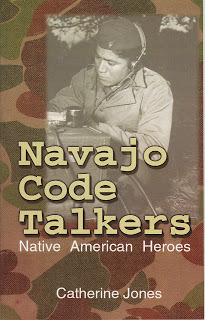
Published on October 16, 2013 04:47



